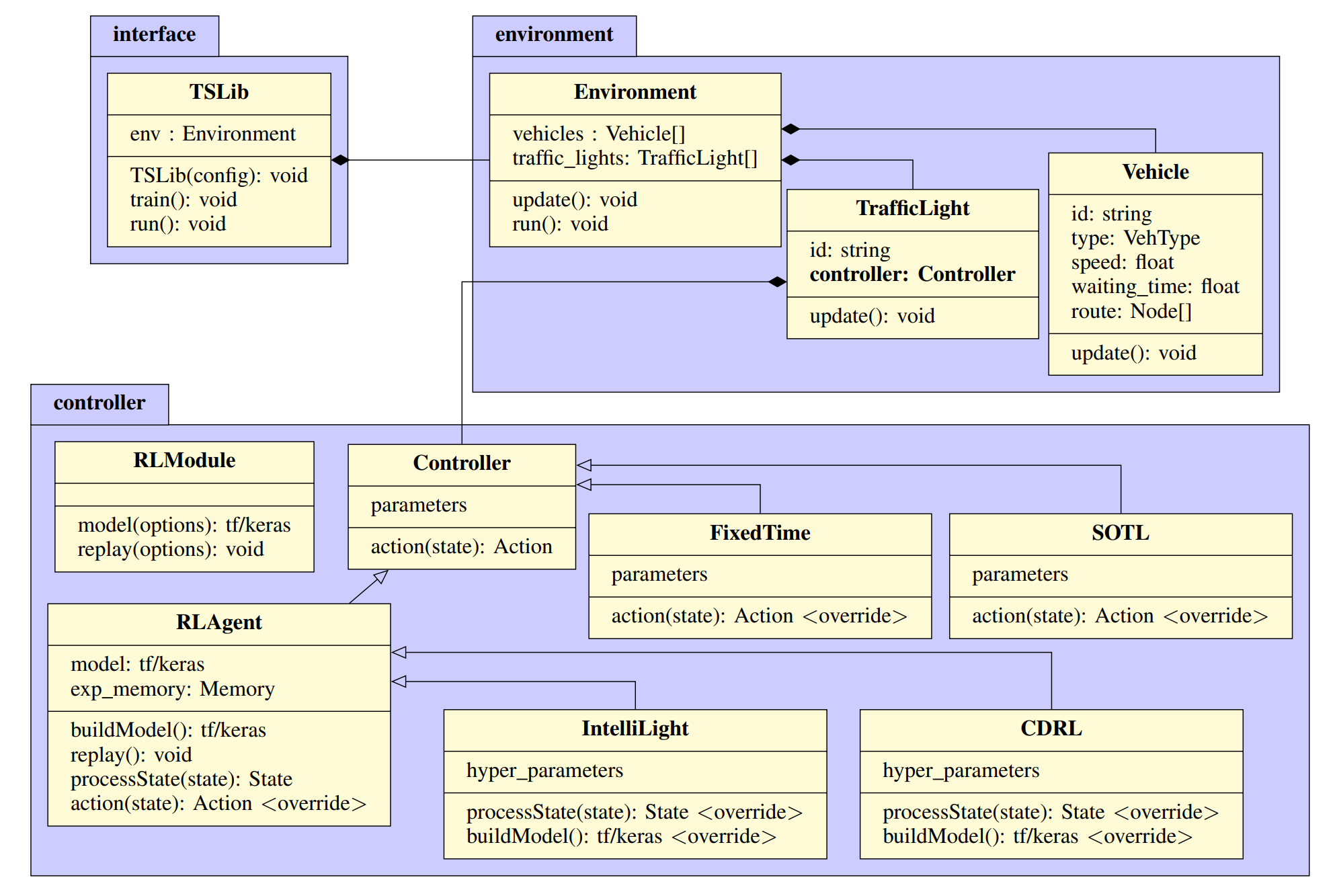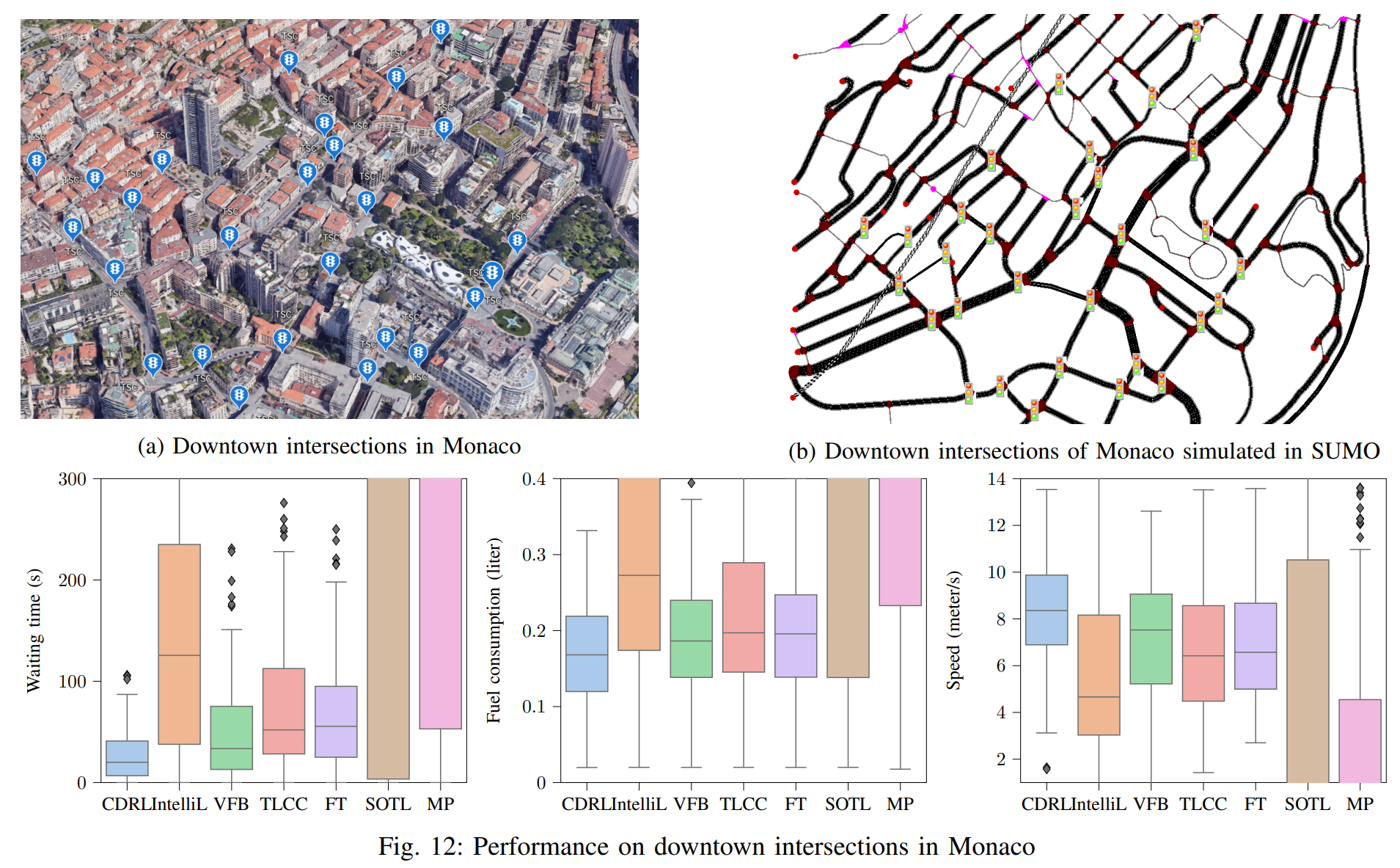TSLib: A unified Traffic Signal Control framework using deep reinforcement learning and Benchmarking
Feel free to reach me at toan.tranviet@ieee.org if you have any issues or need help to run the code
Please refer to our work:
@INPROCEEDINGS{9671993,
author={Tran, Toan V. and Doan, Thanh-Nam and Sartipi, Mina},
booktitle={2021 IEEE International Conference on Big Data (Big Data)},
title={TSLib: A Unified Traffic Signal Control Framework Using Deep Reinforcement Learning and Benchmarking},
year={2021},
pages={1739-1747},
doi={10.1109/BigData52589.2021.9671993}}
This framework offers training/testing Traffic Signal Controls (TSC) including both traditional and advanced methods.
Using docker:
docker pull viettoantran98/tslib:0.0.1
Clone the updated source:
git clone https://github.com/Laysest/tslib
See in some examples.
from src.tslib import TSLib
config = {
'net': 'isolated-intersection/testbed-a-hour/road.net.xml',
'veh_type': 'type.xml',
'route': 'isolated-intersection/testbed-a-hour/flow.route.xml',
'end': 600,
'gui': False,
'simulator': 'SUMO',
'traffic_lights': [
{'node_id': 'gneJ1',
'method': 'CDRL',
'yellow_duration': 3,
'cycle_control': 5,
'folder': './model/most/CDRL2'}
],
'log_folder': './log/dev/testbed-a-hour'
}
env = TSLib(config)
env.train()
# env.run()
Where:
- 'net': the road structure file
- 'veh_type': defines vehicle characteristics
- 'route': the workload file
- 'end': the maximum step of simulation
- 'gui': enable GUI or not
- 'simulator': currently SUMO and CityFlow are supported
- 'traffic_lights': an array, each element is used for one intersection
- 'log_folder': for log
python3 SUMO_one_intersection_Chattanooga.py
from src.tslib import TSLib
config = {
'simulator': 'CityFlow',
'config_file': './src/traffic-cityflow/isolated-intersection/hz-bc-tyc_1/config.json',
'traffic_lights': [
{
'node_id': 'intersection_1_1',
'method': 'CDRL',
'yellow_duration': 3,
'cycle_control': 5,
'folder': './model/most/CDRL2'
}
],
'end': 3600,
'log_folder': './model/most/CDRL2'
}
env = TSLib(config)
env.train()
# env.run()
Where:
- 'config_file': the configuration of your simulation, including information of road structures and workloads
- **FT** Fixed Time
- **SOTL** C. Gershenson, “Self-organizing traffic lights,”Complex Systems, vol. 16, no. 1, 2004.
- **MaxPressure** P. Varaiya, “The max-pressure controller for arbitrary networks of signalized intersections,” 2013.
- **VFB** S. Mousavi, M. Schukat, P. Corcoran, and E. Howley, “Traffic Light Control Using Deep Policy-Gradient and Value-Function Based Reinforcement Learning,”IETIntelligent Transport Systems, vol. 11, 2017.
- **IntelliLight** H. Wei, G. Zheng, H. Yao, and Z. Li, “Intellilight: A reinforcement learning approachfor intelligent traffic light control,” inProceedings of the 24th ACM SIGKDD Inter-national Conference on Knowledge Discovery & Data Mining, pp. 2496–2505, ACM,2018.
- **TLCC** X. Liang, X. Du, G. Wang, and Z. Han, “A deep reinforcement learning network for traffic light cycle control,”IEEE Transactions on Vehicular Technology, vol. 68, no. 2,pp. 1243–1253, 2019
- **CDRL** Van der Pol, E., & Oliehoek, F. A. (2016). Coordinated deep reinforcement learners for traffic light control. 30th Conference on Neural Information Processing Systems, Nips, 2018.
- **CAREL** Rodrigues, F., & Azevedo, C.L. (2019). Towards Robust Deep Reinforcement Learning for Traffic Signal Control: Demand Surges, Incidents and Sensor Failures. 2019 IEEE Intelligent Transportation Systems Conference (ITSC), 3559-3566.

